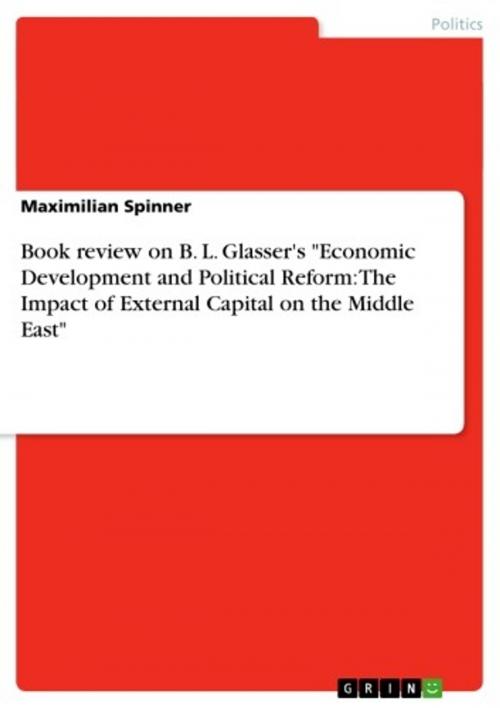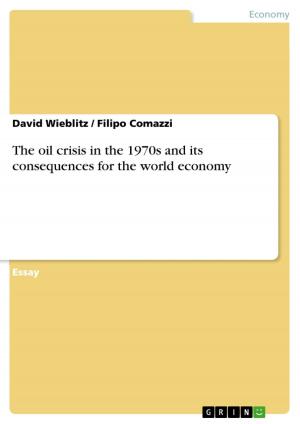Book review on B. L. Glasser's 'Economic Development and Political Reform: The Impact of External Capital on the Middle East'
Nonfiction, Social & Cultural Studies, Political Science, International, International Relations| Author: | Maximilian Spinner | ISBN: | 9783638190787 |
| Publisher: | GRIN Publishing | Publication: | May 26, 2003 |
| Imprint: | GRIN Publishing | Language: | English |
| Author: | Maximilian Spinner |
| ISBN: | 9783638190787 |
| Publisher: | GRIN Publishing |
| Publication: | May 26, 2003 |
| Imprint: | GRIN Publishing |
| Language: | English |
Document from the year 2003 in the subject Politics - International Politics - Region: Near East, Near Orient, grade: A, Central European University Budapest (Department of Political Science), course: The New Political Economy of Development, language: English, abstract: Oil seems to prevent the development of democracy and a free market economy. Oilrich countries as diverse as Nigeria, Saudi-Arabia, Irak, Iran, Venezuela or Azerbaijan appear to be among the least democratic countries with highly closed economies and little signs of change in their course. This assumption can be confirmed by the empirical correlation between low indices in democratic rule and in the openness of the economy, and the endowment with natural resources. Intuitively everybody could explain that in each of these countries a narrow elite can keep up this state due to almost unlimited and unconditional cash inflows compensating for ineffective economic structures and buying off the population with populist policies in subsidizing consumption or low taxation. In his book Economic Development and Political Reform - The Impact of External Capital on the Middle East Bradley Louis Glasser puts the development of Middle Eastern states with different degrees of resource endowment into a broader perspective. Economic liberalization and democratization are explained in the context of external capital contributing to both economic development theories and transitology.
Document from the year 2003 in the subject Politics - International Politics - Region: Near East, Near Orient, grade: A, Central European University Budapest (Department of Political Science), course: The New Political Economy of Development, language: English, abstract: Oil seems to prevent the development of democracy and a free market economy. Oilrich countries as diverse as Nigeria, Saudi-Arabia, Irak, Iran, Venezuela or Azerbaijan appear to be among the least democratic countries with highly closed economies and little signs of change in their course. This assumption can be confirmed by the empirical correlation between low indices in democratic rule and in the openness of the economy, and the endowment with natural resources. Intuitively everybody could explain that in each of these countries a narrow elite can keep up this state due to almost unlimited and unconditional cash inflows compensating for ineffective economic structures and buying off the population with populist policies in subsidizing consumption or low taxation. In his book Economic Development and Political Reform - The Impact of External Capital on the Middle East Bradley Louis Glasser puts the development of Middle Eastern states with different degrees of resource endowment into a broader perspective. Economic liberalization and democratization are explained in the context of external capital contributing to both economic development theories and transitology.















